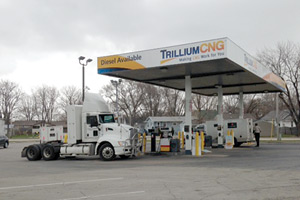Trucking’s Adoption of Natural Gas Slows, but Fleets, Analysts See Brighter Future

This story appears in the May 4 print edition of Transport Topics.
The trucking industry’s adoption of natural gas has slowed in the past 18 months as diesel prices declined, but analysts and fleet executives maintain the alternative fuel will play a larger role in freight transportation over the longer term.
The Department of Energy said use of natural gas as a transportation fuel declined 2.3% in 2014 from the previous year, coinciding with an 80-cent plunge in diesel prices and a 50% drop in crude oil from June to December to just over $53 a barrel on the New York Mercantile Exchange.
Similarly, NGVAmerica found that the overall natural gas-powered vehicle market fell about 6% in 2014 from 2013. However, the decline was mostly in lighter-duty vehicles while the heavy-duty market rose by 30%, with about half of that gain in the refuse-hauling sector.
“The oil price volatility has created some uncertainty,” said Matt Godlewski, NGVAmerica’s president. “But fleets that have already made the investment in the fueling infrastructure and know how the vehicles operate are continuing with the transition.
“We had a lot of people telling us they would have bought natural-gas vehicles last year, but because the freight market was so tight [and] building an NGV is more complicated and takes longer, they passed,” he told Transport Topics.
Some carriers are moving ahead with more alternative fuel investments, such as UPS Inc., which recently said it planned to build 15 more compressed natural gas stations and that it added 64 liquefied natural gas tractors to its worldwide fleet of more than 2,500 natural-gas vehicles.
However, others that previously invested in natural gas are pulling back, at least temporarily, on further purchases because of the lower diesel prices and improvements in diesel-powered equipment over the past few years.
“We haven’t cut back; we’re just not buying new natural-gas trucks right now,” said Jeff Shefchik, president of Paper Transport Inc. in Green Bay, Wisconsin, which operates 100 CNG trucks out of its 500-truck fleet. “It’s just a timing issue. Long term, I believe there is still opportunity for natural gas to play a large role as a transportation fuel.”
Shefchik added that natural gas as a trucking fuel “is very application-specific — there are some applications that make sense, and some that don’t, because diesel’s down $1 a gallon” from a year ago.
“That’s a significant drop. In our application as an over-the-road truckload carrier, today we can’t get the economics to work,” he told TT, noting that, in his operation, CNG equates to about a 25% loss in fuel economy over diesel compared
with refuse trucks, which may take about a 10% loss.
“A lot of that is the new diesel trucks are just so much better than they were five years ago,” he said. A typical natural-gas truck configuration can add $50,000 or more to the cost of a typical Class 8 truck.
Another carrier based in Green Bay, Contract Transport Services, is moving ahead with aggressive alternative-fuel plans, said Curt Reitz, the president.
He told TT the fleet hopes to convert its entire 150-truck fleet to CNG by the end of 2017. It started with 31 CNG trucks that it began running in August 2013.
Reitz acknowledged that every 10-cents drop in diesel equates to one additional month of ROI time for his fleet’s CNG purchases.
It has a negotiated discount purchase rate to buy most of its fuel from Trillium CNG, which builds fueling stations.
The heavy-duty over-the-road market is expected to add 3,000 to 3,500 new CNG engines this year, said Bill Zobel, Trillium’s vice president of market development and strategy.
“The market has a better fix on growth today than it did a few years back, based on advancements in CNG storage, delivery, and engine technology,” he said. “I suspect you will see better long-term forecasts as we move ahead.”
ACT Research Co. said in a recent report that fleets are not turning to natural gas-fueled trucks as fast as had been projected two years ago because of the drop in diesel prices.
“With the price differential between diesel and natural gas narrowing, the [return on investment] to convert from diesel to natural gas is moving in the wrong direction, and payback periods are lengthening,” said Ken Vieth, ACT Research senior partner.
ACT Research is not affiliated with the Alternative Clean Transportation (ACT) Expo, convening this week in Dallas.
“On the plus side, there’s still a lot of infrastructure going on — stations and the tank makers are coming up with ways to get more fuel on board with less weight,” Vieth told TT.
Adoption is also slowing “because you’ve got so much more energy in diesel,” Vieth added. “What was 18 months before could now be three to seven years,” he said, referring to the return on investment.

